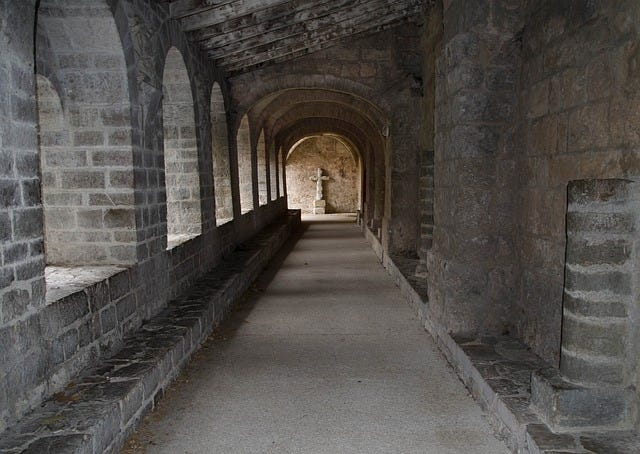I was listening to a talk on YouTube by an exorcist recently. The talk was on levels of spiritual warfare. I drew from the talk a “mission statement” of sorts for those of us who live in this dark time in history. It is a “mission statement” of hope.
To say that we live in a dark time may sound melodramatic, but there is really no argument that we do, in fact, live in a very dark time. On the spiritual level, the exorcist placed our current era in context for me. In 1963, the exorcism of a possessed person might take, on average, 1-2 days. A couple of years ago, that had grown to 2 years for liberation. More recently, it had grown to 4 years for liberation. Exorcists are now apparently commenting that possessed people are not being set free.
This astonishing trend is a reflection of two things. On the one hand, we see that Satan has been given more power. There has been an increase in occultism, paganism, witchcraft, satanism and all kinds of evils in the world. Terrible sins are multiplied everywhere. By them, humanity has given over great power to Satan and his legions. On the other hand, it reflects the spiritual weakness and lack of holiness among Catholic Christians today. We can say this because the power of exorcism in the Catholic Church does not come from the personal holiness of the priest. The priest acts as a minister of Christ and His Church. His power to cast out demons using the prayers of exorcism thus comes from the spiritual strength of the Church.
This exorcist is not the only person delivering this message. David Torkington, a spiritual writer who has been teaching people to pray for over forty years and who I have referenced before, has come to the same conclusion from a different angle. He has recently been saying that the problem with the Church is that people do not pray. He believes that one reason we had the sexual abuse crisis was a lack of authentic prayer among the clergy. People are not praying in an authentic, mystical and personal way that exposes them daily to the love of God and results in transformation.
Where does leave us? As ordinary Christians, we have to face this reality with hope. Jesus is Lord over all creation.
My take-away of a “mission statement” for those of us who live in this dark time is this:
We have a unique opportunity in the history of the Church to become saints.
Indeed, by God’s grace we can become greater saints than those who have come before us. St. Paul tells that that “where sin increased, grace abounded all the more.”1 God is pouring out more grace for us than ever before. It is our mission to respond to the graces that He is giving us and become as holy as possible.
That being said, what is one of the biggest obstacles we face in trying to become holy? A lack of true self-knowledge. The book of the prophet Hosea tells us, “My people are destroyed for lack of knowledge.”2
God the Father explained to St. Catherine of Sienna that self-knowledge is vital to the spiritual progress of the pilgrim traveler. We are not talking about narcissism here; rather we are talking about humility. Humility is recognition of the truth, both good and bad, about ourselves.
St. Catherine summed this up in a letter:
Build yourself a spiritual cell, which you can always take with you, and that is the cell of self-knowledge; you will find there also the knowledge of God's goodness to you. There are really two cells in one, and if you live in one you must also live in the other, otherwise the soul will either despair or be presumptuous; if you dwelt in self-knowledge alone you would despair; if you dwelt in knowledge of God alone you would be tempted to presumption. One must go with the other, and thus you will reach perfection.
If our mission statement is to become holy, which all of us are called to do (the Church does teach the “universal call to holiness”), what are some obstacles we face to obtaining true self-knowledge? I came across an article that suggest five obstacles to self-knowledge. Here are my thoughts on these obstacles, with one more thrown in.
We do not examine ourselves regularly.
Traditionally, Catholics were taught to engage in a daily examin before retiring for the evening. This is not a full examination of conscience for confession, but an examination of how we did today. Did I sin? Did I fail to respond to grace? Or, how did I respond to grace?
It is easier to see the faults of others and so we focus on that.
This is a universal truth of humanity. So how do we correct that? We can start by looking at our predominant fault or areas where we are weak to sin or temptation. We can ask Our Lady of Sorrows to show us our predominant fault, or the fault that we need to work on the opposite virtue to overcome. When we start to recognize our own faults, we can become more merciful about our neighbor’s faults.
Each of us faces different temptations and attacks by the devil and his demons. When we are being tempted to sin, it is because God is allowing the demons to attack us in this area. Demons are only allowed to do what God gives them permission to do. And God allows temptations in specific areas to drive us to develop counter-virtues. He wants us to become stronger in the opposing virtue or virtues and to shine in victory. If we are faithful and use the means available to us (the sacraments, a prayer life) God will give us the grace to resist, overcome and grow in virtue.
A lack of silence in our lives.
This is a major problem today and makes prayer difficult if not impossible for most people.
Not spending quality time with God.
When we do pray, what kind of time and attention are we giving to God? This is what David Torkington is getting at. Vocal prayers are good. Liturgical prayers are good. But if we do not engage in meditation or contemplation—intimate prayer with God—we are unlikely to grow.
Adoration of Jesus truly present in the Blessed Sacrament is one way to spend quality time with the Lord. Mother Teresa said “the time you spend with Jesus in the Blessed Sacrament is the best time you will spend on earth.”
Pride.
Ultimately pride is the biggest obstacle to true self-knowledge and spiritual growth. In our modern society, especially in the United States, we practically worship self sufficiency and hypersensitivity. The self-sufficient will not ask for help. The hypersensitive are offended by “micro aggressions.” These attitudes are enemies to an authentic spiritual life.
Of course, we are all wounded and infected by pride. That is the human condition after the fall. We need to meditate on the virtue of humility. The foundational virtue for a Christian is humility. As I noted before, humility is recognition of the truth, both good and bad, about ourselves. It is the key to self-knowledge.
Demonic interference.
There is a sixth obstacle that is worth mentioning that is not in the article. That is demonic interference. Because of the significant influence of the enemy is our society, especially in media and the internet, we run the risk of picking up “spiritual barnacles.” Another way to describe this would be “spiritual infection.” This is not “demonic possession.” Rather, it is some form of demonic influence in our life, to a greater or lesser degree. This demonic influence interferes with our discernment. It interferes with our ability to hear God. My prior post on spiritual barnacles discusses this at more length.
God the Father told St. Catherine of Sienna, “You are she who is not; whereas I am He who is.” Jesus said, “apart from me you can do nothing.”3 You can do nothing. This is a clear and unequivocal statement by Our Lord.
When we enter the cell of self-knowledge, we not only look at the fact that I am he who is not, we also bring with us the knowledge of God's love, mercy and goodness to ourselves. And so, this message, this mission statement, is once again a call to each of us to develop an authentic prayer life. To ask God each day to be faithful to grace.
May the Holy Spirit enable you and equip you to become the saint that God is calling you to become, in Jesus’ Name. Amen.
Eric A. Welter is an employment lawyer and trial attorney with a long-time devotion to intercessory prayer. He is a Catholic Christian who has been involved with intercessory and healing prayer ministry for over twenty years. The Abound in Hope Ministry website is https://www.aboundinhope.org/ministry.


